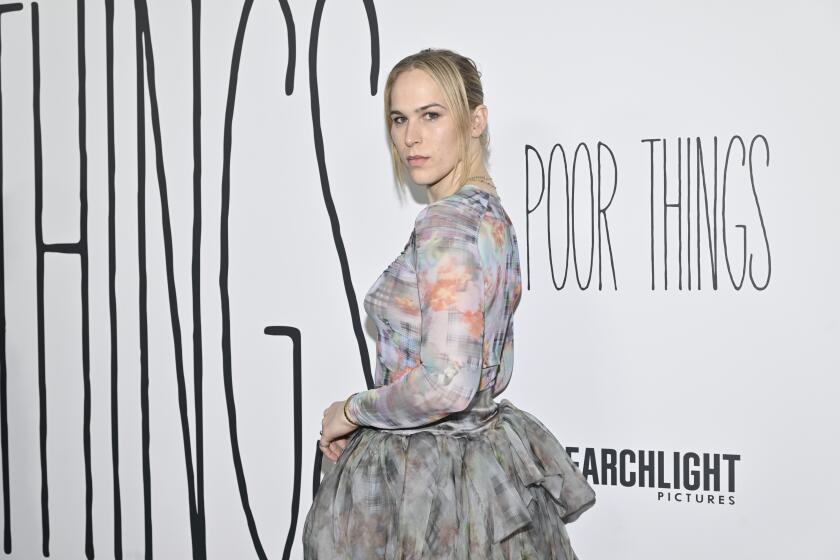A new way to view award nominees: iPhone, iPads or iPod Touch
When it comes to awards season, Hollywood is incredibly low-tech. Voters watch movies on DVDs hand-delivered to their front doors, actors and filmmakers woo supporters at cocktail parties and paper ballots are marked with pen and sent in by mail.
Twentieth Century Fox on Friday took a bold step to push the industry’s annual awards spectacle into the 21st century, announcing that the studio will let members of the Screen Actors Guild download and watch three of its awards hopefuls through Apple Inc.’s iTunes.
Fox’s move may save the studio as much as $1 million a film in DVD manufacturing and distribution costs to reach SAG’s influential membership. But cinematographers and sound designers expressed grave worries over the announcement, fearful that playing movies on small mobile device screens will diminish their work.
If the method catches on, it could give an awards boost to films and studios with limited marketing budgets. And because the iTunes technology eliminates time-consuming shipping, it could even help push up the Oscar broadcast by as much as a month.
Fox initially targeted the 93,000 voting members of SAG, who often don’t receive the dozens of free DVDs sent to the roughly 6,000 members of the Academy of Motion Picture Arts and Sciences who vote for the Oscars. The largest voting branch in the academy is its actors group — about 1,200 strong — and there is a huge overlap between SAG and the academy.
Starting Friday, SAG members will be able to watch “Black Swan,” “127 Hours” and “Conviction” via iTunes. They will receive a specific code to download the three films, distributed by the studio’s Fox Searchlight division, in high definition, and can watch them on a computer, iPad, iPhone, iPod Touch or on television via Apple TV. All three of those films have been nominated for SAG awards (the nominees are chosen by a select 2,500 SAG members). The SAG awards will be handed out on Jan. 30, five days after Oscar nominations are announced.
Fox said it was partially motivated to save money. It can cost a small fortune to deliver security-marked DVDs to the large SAG membership. And without all the shipping logistics involved, the move could allow the studios to reach prospective voters much earlier.
“It levels the playing field,” said Christian Colson, the producer of “127 Hours,” who noted that free-spending studios are more willing to mail DVDs to SAG’s entire membership (as Sony Pictures did with its “The Social Network”). “It democratizes the process,” he said, while expressing some regret that many voters won’t see his film in theaters.
Fox said its decision will make watching awards contenders more convenient.
“This could eventually be an alternative for all awards voters to give them access to our films at an earlier stage or while they are traveling,” Fox co-chairman Jim Gianopulos said. “It’s what technology is all about: Giving people more choices to view films while still recognizing that we would always prefer that they see it in the theater if possible.”
Whether or not other studios follow suit will depend on how successful Fox is with the experiment. Some Oscar marketers are very encouraged.
“It’s innovative and a potentially smart step to getting people to see the films,” said Oscar consultant Mara Buxbaum. “When you’re just getting DVDs, and voters get so many, how do you make sure it’s at the top of the pile? This is another viewing option to make it easier for voters.”
But the move raises several concerns: Will the technology be susceptible to pirating? And if voters watch films on a small device like an iPhone, will some of the films’ artistic merits be lost?
“Security has always been the issue and if this is something that is secure it’s of interest to everybody,” said Jeff Blake, vice chairman of Sony Pictures Entertainment.
Some filmmakers were initially unhappy with the advent of DVD screeners in the late 1990s because it meant that thousands of awards voters would see their movies not on the big screen of a theater but on television at home. The iTunes deal takes that trend even further: The iPad’s screen is smaller than 10 inches diagonally, while the viewable area on the iPhone is only 31/2 inches diagonally.
“There’s no way you can get the same experience with an iPad,” said Bobbi Banks, president of the motion picture sound editors guild. “You will not be able to judge correctly the intensity of a movie’s soundtrack. It’s going to be very limited.”
Michael Goi, president of the American Society of Cinematographers, denounced the move. “The ASC and its Members have always been proponents for exploring new technologies for their value in our profession,” he said in a statement. “But a motion picture is composed and photographed to be seen on the big screen, so when viewed on a handheld device such as an iPhone or iPad, the entire artistic intention of the visuals, and the emotional impact it could have, is lost.”
But Anthony Dod Mantle, one of two cinematographers on “127 Hours,” joked that voters can now watch his spectacular shots of Utah’s wilderness on their way to work. “iPhones and iPads are a great step forward,” Mantle said in an e-mail. “You can also watch them whilst driving a car to work. Hail the new era.”
Sending out DVDs to awards voters has also raised piracy issues; despite watermarking and other methods of deterrence, copies have made their way around the world. If Fox’s experiment yields no unauthorized copying from the iTunes accounts of SAG members, rival studios might be inclined to try it themselves.
One group watching the most closely: the academy.
Concerned that television viewers are worn out by other awards shows by the time the Academy Awards are broadcast in late February, the academy has been looking for ways to boost ratings for the Oscar telecast, including moving the ceremony up into late January. But it has been stymied by the amount of time it takes to issue DVDs and mail and receive nominating and final voting ballots.
“We certainly are keeping an eye on it,” said Bruce Davis, the academy’s executive director. “It does kind of streamline the whole process.” But Davis, like many members of the academy, doesn’t want to sacrifice the quality of the presentation for speed. “You want to make sure the contending films are available, but can be seen in high quality.”
Tom Sherak, the academy’s president, said Fox’s iTunes deal might also be the first step toward Internet voting.
“If this works as an experiment, hopefully the studios will all become comfortable, and then the next thing would be how can we secure our voting online,” Sherak said. “If those two things can be solved, it would make us more confident to bring a proposal back to move the show up earlier in the year.”
Times staff writer Ben Fritz contributed to this report.
More to Read
The biggest entertainment stories
Get our big stories about Hollywood, film, television, music, arts, culture and more right in your inbox as soon as they publish.
You may occasionally receive promotional content from the Los Angeles Times.







